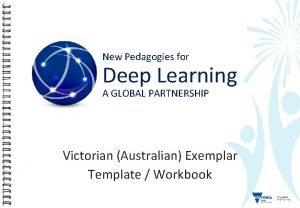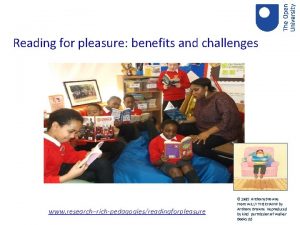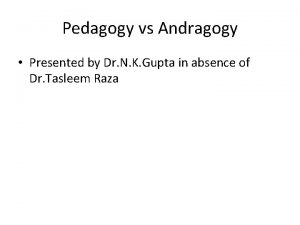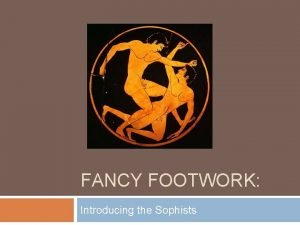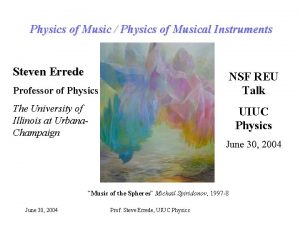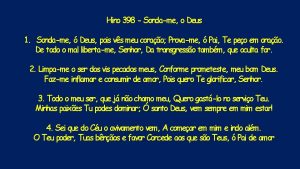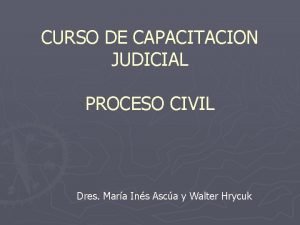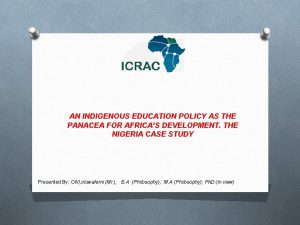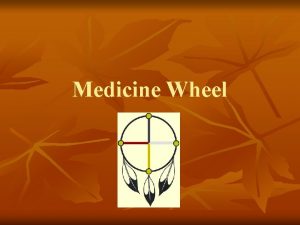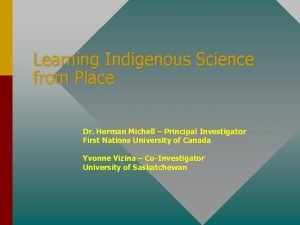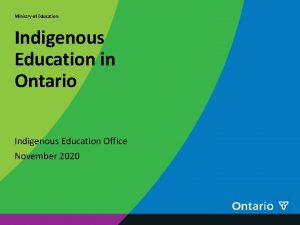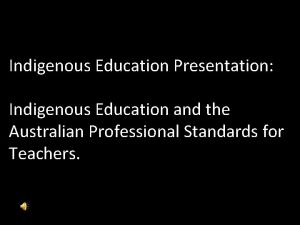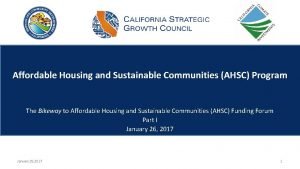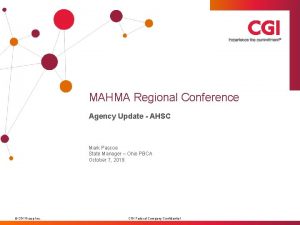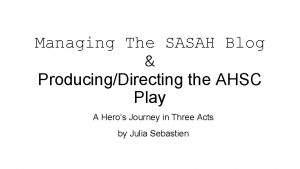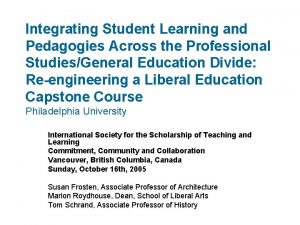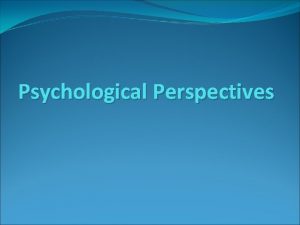Education Indigenous pedagogies AHSC 398 Indigenous Perspectives across










- Slides: 10

Education: Indigenous pedagogies AHSC 398 – Indigenous Perspectives across disciplines Week 4 – February 1 st, 2017

Forever Learning, Simone Mc. Leod et Anishinaabe artist/po da from Manitoba, Cana

Select models to address colonial history in education Author and reference Description of the Main objectives approach Means employed Bill Bigelow and Bob Peterson (1998) Rethinking Columbus. The next 500 years. Alternative account to the “Discovery myth” taught for so long in schools. Native people telling their side of the encounter – interviews, poetry, analysis, and stories, . Parts of the story that have been mostly neglected. Addressing the origins of racism, economic exploitation and resistance. Moving out of the victim and/or “conquered” position.

Select models to address colonial history in education Author and reference Description of the approach Tribal Critical Race Indigenous Peoples' Theory identity in terms of: (Brayboy, 2005) (1) the problems encountered in educational institutions; (2) the educational programs that are in place to uniquely serve American Indian communities; and (3) the complicated relationship between "American Indians" and the United States federal government Main objectives Means employed (1) Unveiling the endemic colonization (institutions, knowledge, policies) and the impacts on Indigenous identity (marginalization, racialization). (2) Addressing resistance of Indigenous peoples’ projects of sovereignty, autonomy and self-determination. Resistance to assimilation: maintaining and adapting Indigenous identity and cultural integrity. Self-education, Indigenous ways of knowing and values, Indigenous sources of data and theory in stories and oral knowledge. Stories as resistance and survivance of indigenous knowledges.

Select models to address colonial history in education Author and reference Description of the approach Susan Dion (2007) Remembrance “Disrupting Molded approach: Images: Identities, The students recognize responsibilities and their investments in relationships” relationships structured by particular ways of knowing Aboriginal people. Main objectives Means employed Counter stereotyping and other negative effects of the “cultural difference” approach. Awareness of how Aboriginal and non. Aboriginal identities have been shaped by the colonial encounter and its aftermath. Dialogue between students’ own experiences and memories, and Indigenous texts/productions.

Select models to address colonial history in education Author and reference Description of the approach Stephanie Irlbacher. Co-resistance for co. Fox (2014) existence: “Traditional knowledge, co. Resistance to existence and coinjustices as the basis resistance” of the relationship. Main objectives Means employed Redefined the socalled “Indian problem” into the “settler” or the “privilege” problem. Refuse to collaborate in maintaining injustice as the basis of the relationship between the state and Indigenous Peoples Deconstructing issues in ways that center settler privilege as the focus of analysis, instead of the mainstream standard highlighting Indigenous “difference” from a settler-based norm.

Select models to address colonial history in education Author and reference Description of the approach Corey Snelgore, Indigenous Rita Kaur Dhamoon, resurgence: Jeff Corntassel (2014) Responsibility-based “Unsettling settler ethic of truth-telling to colonialism: The identify and act upon discourse and politics new pathways to of settlers, and Indigenous resurgence solidarity with Indigenous nations” Main objectives Means employed Restore and regenerate Indigenous nationhood. Repatriation of Indigenous life and land. Call for justice and the return of stolen lands/waterways and their special relationships with Indigenous Peoples. Relational analysis of colonial issues (instead of onedimensional analysis based on the settler). Place-based solidarity: engagement with the literal and stolen ground on which people stand come together upon.

Select models of Indigenous approaches to education Model (authors) Storytelling, storrying and counter-stories (Grande et al. , 2015) Description of the model Response to colonial history and colonial violence. Main objectives (1) Remembrance: Looking at one’s community history, remembering Indigenous knowledges Indigenous voices and maintaining and stories. Indigenous philosophies. (2) Reclamation: Taking Indigenous histories back spaces, places and Indigenous perspectives, reconnecting. perspectives on (3) Regeneration: moving histories. forward as contemporary peoples, based on traditional values. Means employed Remembering the history of colonialism and recognizing its effects. Answer and resist colonial legacy through Indigenous stories. Storytelling of ancestral and contemporary histories in the schooling process (Chi'Xap. Kaid, 2011 [2005]).

Select models of Indigenous approaches to education Model (authors) Description of the model Indigenous Community- Education that respect based pedagogy Indigenous sovereignty, (Ball, 2007; García, and is accountable to Lozano, Olivera, & Indigenous communities Ruiz, 2004; Mc. Carthy (Mc. Carthy & Lee, 2014; Urrieta, 2014). 2013) The knowledges include daily, complex, relational, and reciprocal relationships in family and community life (Urrieta, 2013), and are transmitted in those community and family settings (García et al. , 2004). Main objectives Means employed Cultural sustainability and revitalization (including language) (Mc. Carthy & Lee, 2014). Nation/Community building. Sustaining the communal wisdom and good life (García et al. , 2004). Understanding and forging belonging, responsibility, and integration into family and community life (Urrieta, 2013). Community-based education partnerships between First Nations and postsecondary institutions (Ball, 2007). Intent Community Participation (Urrieta, 2013). Learning Communities and learning through community experiences (García et al. , 2004). Community-based accountability (Mc. Carthy & Lee, 2014).

Select models of Indigenous approaches to education Model (authors) Place-Based and Land-Based pedagogy (Henry, 2014) (Irlbacher-Fox, 2014) (Wildcat et al. , 2014) Description of the model Transmission of knowledge about governance, ethics and philosophies that arise from relationships on the land (Wildcat et al. , 2014). Main objectives Reinhabitation and Decolonization (Henry, 2014) Privilege refusal and reversal (Irlbacher-Fox, 2014). Direct contestation to settler colonialism. Resurgence of Indigenous life Reinserting people into relationships with Indigenous claims to land (Wildcat et al. , and on the land, within frameworks of 2014). Indigenous intelligence, as a mode of education (Wildcat et al. , 2014). Means employed Learn forgotten or unheard Aboriginal, immigrant, and settler histories in their neighbourhood. Arts-based approaches and engagement with specific communities or organizations (Henry, 2014). In Indigenous communities and on Indigenous land, positioning non-Indigenous individuals as students of, and dependent on, Indigenous peoples, which reverse the usual power dynamics (Irlbacher-Fox, 2014).
